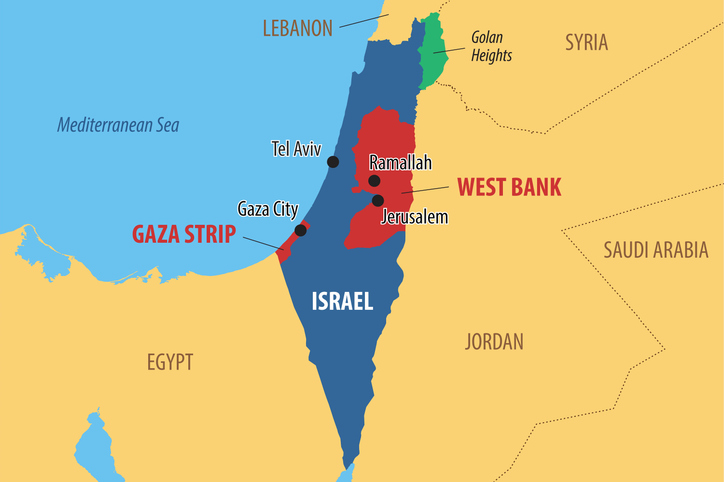Human Rights Watch Report Accuses Israel of Mass Displacement in Gaza, Highlighting Humanitarian Concerns and Potential War Crimes
Human Rights Watch (HRW), the prominent US-based advocacy organization, recently released a 154-page report accusing Israel of conducting a campaign of forced displacement in Gaza. According to HRW, this campaign could constitute war crimes and crimes against humanity, marking one of the organization’s most comprehensive investigations into the impact of Israel’s military strategies on Gaza’s civilians. As the report details, over 1.9 million Palestinians—over 90% of Gaza’s population—have been displaced in recent years, with large sections of civilian infrastructure and housing destroyed or rendered uninhabitable. The HRW report has reignited debate on international humanitarian responsibilities and highlighted tensions surrounding the humanitarian crisis in Gaza.
Context of the Displacement: A Longstanding Tension
Since Israel’s withdrawal from Gaza in 2005, the region has experienced a turbulent dynamic, with repeated cycles of violence, border blockades, and political upheaval. Israel contends that its actions are a matter of national security, asserting that the blockades and military operations are necessary to counter threats from Hamas, the governing political and militant faction in Gaza that Israel and several other countries have designated as a terrorist organization. Israel’s government states that its policies, including evacuations and destruction of specific areas, are intended to prevent infiltration and protect Israeli civilians from cross-border attacks.
According to HRW, however, Israel’s strategy in Gaza has escalated into what the organization calls a “deliberate and systematic campaign” of forced displacement. HRW’s Nadia Hardman, a researcher on refugee and migrant rights, claims that the scale of destruction and displacement in Gaza is not incidental but rather indicative of a controlled operation to create “buffer zones” or “security corridors.” These areas, which the report says are often completely leveled, have become central to discussions about Israel’s approach to Gaza’s governance and its responsibilities under international law.
Human Rights Watch Findings: Systematic Destruction and Displacement
HRW’s report argues that the forced displacements represent a substantial violation of international law. The organization describes the extensive destruction in Gaza, noting that the demolition of homes, healthcare facilities, water systems, and schools has left countless families without basic needs. According to UN figures cited by HRW, nearly 2 million Palestinians in Gaza—overwhelmingly civilians—have been impacted, facing severely restricted access to food, clean water, and healthcare. HRW also states that many displaced residents face further hardships as escape routes have allegedly been blocked or targeted by ongoing military activity, leaving few options for safe relocation.
“This isn’t simply a matter of combat affecting civilians,” Hardman said. “When so much essential civilian infrastructure is deliberately destroyed, it not only violates international law but also points to a pattern of forced displacement.”
Among the damaged areas, HRW highlights that medical facilities and schools have been heavily impacted. Many areas designated as “safe zones” for displaced civilians have reportedly come under attack or been cut off from supplies, further exacerbating the humanitarian crisis.
Israel’s Defense and Military’s Response to HRW’s Accusations
Following the release of the HRW report, the Israeli military issued a statement defending its operations and reiterating its commitment to international law. According to the Israeli military, it issues warnings to civilians in conflict zones and works to minimize harm by directing residents to evacuation corridors. Officials have argued that many casualties in Gaza are the result of Hamas embedding itself within civilian areas, complicating Israeli efforts to target militants while sparing civilian lives.
Israel has also denied accusations that it operates a policy aimed at maximizing damage to civilian infrastructure. An Israeli military spokesperson pointed out that all complaints and allegations regarding breaches of international law are referred to an internal review board for investigation. Israel maintains that its approach is consistent with its obligations to protect civilians during military operations, although international criticism has remained steadfast.
The Israeli government has stated that its security goals in Gaza do not include permanent occupation of the territory or the displacement of civilians. Prime Minister Benjamin Netanyahu previously said that Israel’s objective is to “neutralize threats” in Gaza and that the government has no intention of forcibly removing Gaza’s residents. However, some ministers within Israel’s government have expressed divergent views, leading to speculation about future policies for Gaza. National Security Minister Itamar Ben-Gvir and Finance Minister Bezalel Smotrich have advocated for the promotion of “civilian emigration” from Gaza, a stance that has drawn both domestic and international criticism.
The Broader Humanitarian Crisis: Calls for Action and Aid Agency Warnings
The humanitarian impact of the crisis in Gaza has been widely reported, with international aid agencies warning of critical shortages in food, water, and sanitation. The United Nations, along with several NGOs, has described the situation as “catastrophic,” warning that the health and well-being of Gaza’s population is at significant risk. The UN Office for the Coordination of Humanitarian Affairs (OCHA) has also raised concerns about Gaza’s already strained healthcare system, which has suffered further setbacks due to the ongoing military operations.
In a recent statement, HRW urged international bodies, including the International Criminal Court (ICC), to investigate the situation in Gaza for possible crimes against humanity. HRW has called on countries to reconsider arms sales to Israel and consider imposing sanctions to encourage Israel’s adherence to international humanitarian obligations. In its recommendations, HRW called on Israel to enable the safe return of displaced civilians to their homes, stressing that the mass displacement represents a violation of Palestinians' right to reside in their homeland.
US and International Responses: Complex Diplomatic Terrain
The HRW report comes amid a broader discussion within the US and other nations about Israel’s compliance with humanitarian obligations. Earlier this month, the US State Department confirmed that Israel had not violated American laws pertaining to humanitarian responsibilities in Gaza. This stance has stirred debate, particularly as humanitarian agencies and advocacy groups continue to warn about severe conditions in northern Gaza, where large-scale displacement has led to significant health and economic repercussions.
Critics argue that US policy on Israel’s actions in Gaza lacks consistency with international humanitarian standards, while others contend that Israel’s actions are justified in light of the security threats posed by Hamas. The complex diplomatic dynamics surrounding the US-Israel relationship have made it challenging for international bodies to reach consensus on how to address the ongoing humanitarian concerns in Gaza.
Human Rights Concerns and Historical Context
The humanitarian and legal implications of forced displacement in Gaza have brought renewed attention to the history of the Israeli-Palestinian conflict, with HRW’s report emphasizing the significance of Gaza’s civilian population in the context of international law. Forced displacement, if proven to be systematic and deliberate, can constitute a crime against humanity under international law. Legal experts note that while countries have a right to defend against security threats, international law imposes strict limitations on measures that disproportionately affect civilian populations.
Historically, Gaza has faced significant challenges due to its political isolation, economic hardships, and demographic density. As a heavily populated region with limited resources, the area’s infrastructure has struggled to keep up with demand, and periodic escalations in the Israeli-Palestinian conflict have exacerbated these conditions. The ongoing situation in Gaza has intensified calls from the international community for sustainable, peaceful solutions that respect both the security needs of Israel and the humanitarian rights of Gaza’s residents.
HRW’s Recommendations and Potential Future Actions
HRW’s report advocates for a thorough investigation by the ICC to assess whether forced displacement and other actions in Gaza constitute crimes against humanity. The organization has emphasized the need for accountability and a re-evaluation of international support for military operations that may lead to human rights violations. HRW’s recommendations aim to prevent further displacement and encourage a comprehensive review of policies that impact Gaza’s civilians, urging Israel to enable the safe return of displaced Palestinians.
The call for action from HRW adds to a growing body of advocacy for more protective measures for civilians in conflict zones and a reassessment of military strategies that may undermine humanitarian standards. The international community remains divided, however, on the appropriate measures to take, with ongoing debates over the extent to which governments should intervene or impose restrictions on military practices that affect civilians.
Related: Amsterdam Tensions Erupt as Israeli Football Fans Clash with Pro-Palestinian Groups
A Continuing Crisis with Far-Reaching Implications
As Gaza’s humanitarian crisis persists, HRW’s report has underscored the urgent need for diplomatic engagement and a balanced approach to addressing security and humanitarian concerns in the region. While Israel’s government has defended its operations as lawful and necessary, the international community faces a difficult task in ensuring that military strategies comply with humanitarian obligations. The crisis in Gaza remains a focal point of global human rights discourse, and the ongoing displacement raises complex questions about the limits of security measures in densely populated regions.
HRW’s recommendations highlight a broader imperative for accountability, humanitarian protection, and proactive measures to address the root causes of the crisis. As discussions continue on potential solutions, the international community will play a critical role in shaping policies that respect human rights while promoting security and stability in one of the world’s most contentious regions.











